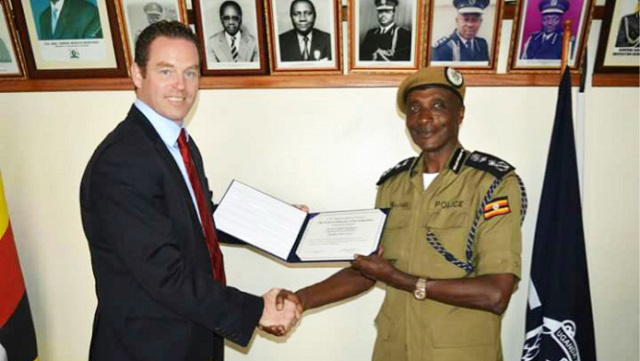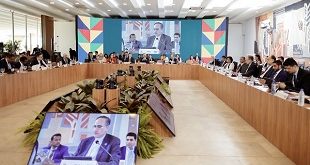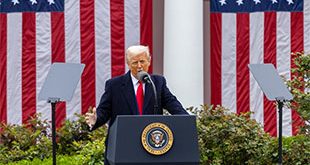
Why we must see America’s summons to Uganda about human rights as an ideological weapon for domination
THE INDEPENDENT | ANDREW M. MWENDA | When the US government sanctioned Uganda’s former Inspector General of Police, Gen. Kale Kayihura, many Ugandans in opposition, traditional and social media and in “civil society” celebrated. This is naïve. Western nations (Europe and her offshoots in North America and Oceania) keep governments and leaders in Africa under pressure to govern in particular ways. Yet they know from their own experience that you cannot impose other countries’ standards, which are alien and totally disconnected with a people’s history, culture, politics etc. and they work.
The common argument among many of our elites is that western nations intrude in our (African) sovereignty because they give financial assistance to our governments. I think this is a very small part of the motivation. There are countries in Africa, like Eritrea, which do not get U.S. assistance but are subjected to the same sanctimonious summons.
The desire, nay the impulse, to lecture and to scold African countries and their leaders on how to govern themselves seems to form an important part of white people’s psychological DNA. The nations of Asia such as Japan, South Korea and China provide huge sums of money to African countries. But they do not lecture and scold our leaders on how to govern. Neither do they speak grandiloquently about how awesome their political institutions and their procedures are and how we should imitate them.
In any case, all of Western Europe lives under the U.S. security umbrella i.e. America pays for their security. But it does not tell them how to govern themselves. Norway, Sweden and Denmark have social democratic policies that are almost the opposite of America’s free market system. However America does not scold and lecture their leaders on how to be good free market copycats.
The reason behind the sanctimonious summons to Africa by the West is racial. There is a deeply engrained, often subconscious, though in some cases conscious, racial superiority complex in the mind of many white people. They believe that Africans are children incapable of self-government and, therefore, need the paternalist hand of white superintendents. This was the basis of colonialism and has never gone away. The view of many white people, consciously or subconsciously, is exactly like what Albert Schweitzer of Gabon fame wrote in the 19th Century: that “the African is a child and with children nothing can be done without authority.”
So deep is the impulse to lecture and scold Africans; especially leaders, that this attitude cannot be found anywhere in the West’s approach, even to child upbringing and education. Many white people who indulge in endless lectures, summons and scolding of African leaders give white children a lot of autonomy to make decisions. They pick the bills and yet give the children freedom to experiment and make mistakes. They recognise that mistakes are necessary for learning.
The same applies to the Western education systems. As one who has benefited from it, I have been impressed and inspired by the attitude lecturers towards students in the West. They allow them to experiment, give them a lot of autonomy and avoid exercising authority over them.
At a personal level, I do not dictate to my son or the many young people I have fostered. I help(ed) finance their education and other needs but I do not see this as a basis to dictate to them how they should lead their lives.
Nations like individuals can change and improve. But they need time and space to do so without intrusions from outside. Besides there is nothing that proves that the richest countries are best placed to judge the internal virtues and vices of poorer nations. More than any other country, the U.S. should be understanding of the complexity of social change.
America was born as a liberal democracy, with a free press, an independent judiciary, a parliament and a presidency held by many checks and balances. Yet it took them 56 years from its Declaration of Independence in 1776 (which said all man are born equal) to granting poor white men the right to vote, 88 years to end slavery, 144 years to give women the right to vote and 188 years to give black people the right to vote. Slavery was ended by a democratic president using emergency powers to issue the Emancipation Proclamation during a civil war. Even then, America had to endure another 100 years of apartheid before black people could be guaranteed the right to vote. This is not to mention that America evolved by genocide of native peoples. Even today, America is involved in torture in her “war against terrorism.”
Americans are not ignorant of this, their history. They know how long it took their country to fight and reduce most of its evils, many of which still persist. This is why we must see America’s summons to Uganda about human rights as an ideological weapon for domination. To function as such, the human rights ideology calls for the rewriting of history, selective indignation and arbitrary priorities. The paradox is that the more ethics advance towards a genuine universality, the more hypocritical America becomes.
In many ways Africa helps white people build their identity and self-confidence. Their sense of superiority and their sense of mission as the world’s civilizers depend on presenting Africans as a barbaric people who need white people to civilise them. It requires a belief that Africans cannot possess a civilisation and a culture equal to that of whites. Because if white people felt such equality with Africans, they would have no purpose and no justification for the domination they seek. They would lose their sense of superiority. So their relationship with Africa requires the reinvention of the African, carrying with it a discourse and a narrative that Africans are barbaric, their leaders are murderous and thieves and therefore need white people to come and save them from themselves.
For Africans, there is a critical need to challenge this moral superiority complex of the West and its reinvention of who we are. They write the script of who we are, what we need and how we should get it. They control nearly all the weapons of mass propaganda. When I see our opposition politicians, “civil society” (largely NGOs paid by the West to do its bidding) and academia celebrating Western attempts to set the narrative about us (Africans), I am only reminded of what the hero of the South African anti-apartheid struggle, Steve Biko said: the greatest weapon in the hands of an oppressor is not his army but the mind of the oppressed. Unless we unwittingly (or knowingly out of personal self interest) acquiesce to such ideological domination, we cannot be conquered.
American leaders in academia, diplomacy and some in the mass media know from experience that politics is much more complicated in practice than in theory. There is a difference between abstract political ideals and actual politics as lived and participated in by people. Governments function in conformity with the norms and traditions of the society, not only on abstract principles of government. Building a nation, a state and its political institutions takes time and is never a result of a single instantaneous decision or lectures from abroad. Political systems develop over time and this always involves mistakes from which participants have to learn. Over time and by slowly responding to circumstantial exigencies, societies develop more mature forms of government.
One does not need to be a philosopher or historian to see this point. Western politicians, journalists, diplomats, academics etc. know this. They ignore it because it is convenient to for them to rely on prejudice to intrude into our affairs for their own interests. This is not the main problem. The real problem is the failure of African elites to see through such attempts to capture our nations and use them to serve interests other than those of our people. Western countries hide their actual intentions behind the smokescreen of human rights, democracy, freedom and good governance.
There is an active effort by governments and institutions in the West to capture us ideologically, and they have succeeded to a great degree. They have built elaborate systems to reward those who accept their interventions (as aimed at our own good) and punish those who seek to expose the selfish, often dark intentions that lie behind these sanctimonious lectures. Decades ago, political struggles were about the ability to control and transmit scarce information. Today they are about the creation and destruction of credibility.
For instance, those who defend Africa from these neo-colonial intrusions are often presented as malcontents supporting tyrants and thieves. The narrative that African leaders are tyrants and thieves has sunk deeply into our social consciousness. It is now the weapon used to delegitimise the state we won through our struggle for independence. That narrative is now used to justify foreign interventions with disastrous consequences for our people as we have seen in Libya.
Today, politicians, journalists, “civil society” activists who defend Western intrusions and regurgitate Western lectures to us are openly supported, invited to conferences, praised in their mass media, given awards and their reputations are nourished. The tragedy is partly the failure of Africa’s political and other leaders to see this, and where they do, to do anything about it. Critics are right to point out that African leaders jump onto Pan-African slogans as a defence against Western attacks, not out of solid commitment to it.
While no single president, political leader, intellectual, academic or journalist can win the war today, each one of us can play a role in recasting the narrative about us. The spokespersons of Western interests in our countries are well protected. If the national government did something bad to them, they will be presented as human rights defenders and democracy activists. Their plight is exaggerated and movingly told, their families taken care of, and given asylum in the West. This is the subtle way in which the West has used the language of human rights to gain both intellectual and ideological control over our national conversations.
Human rights organisations are Fifth columnists in America’s imperial project. Their reports create the justification for America’s wars of aggression, which are sold through its diplomacy and media as altruistic missions to save the vulnerable from their leaders. Their work today mirrors that of the Christian missionaries of the 19th century whose work justified colonialism as coming to bring civilisation and commerce.
We must never forget that those who seek to dominate others always claim to do so for the benefit of their victims. This is not to say that our leaders and the governments they preside over are virtuous. Yet in spite of all the ills they may inflict on us, our sovereignty is important. While there can be sovereignty without democracy, there cannot be democracy without sovereignty! Attempts to undermine our sovereignty are, therefore, acts to undermine our democracy.
Liberal thinking since the 17th century is based on the idea that there are essentially three forms of life in society: Hobbesian anarchy (the war of all against all), The leviathan (an absolute sovereign who imposes peace by force) and a legal democratic order based on the rule of law and individual liberty. Now the dictatorial regimes that the USA and her army of human rights activists denounces, have the advantage of the absolute sovereign i.e. the ability to ensure order by stopping the war of all against all. But the disadvantage here is that such a sovereign acts in his own interests. His authority may not be accepted in the hearts and minds of his subjects; the reason he relies on repression, which provokes protests and revolts calling for more repression. This is the justification for a system based on the rule of law and individual liberty.
All this makes sense when dealing with the internal affairs of nations. But let us now turn to international affairs. If we do not respect national sovereignty, the sovereign would be the USA. It is a great power that engages in international affairs in pursuit of her national interests. Its role in international affairs is therefore exactly like that of a leviathan, an exercise of arbitrary power for her own interests. America is not intervening in Uganda to help Ugandans. It is intervening in promotion of her national interests.
Sometimes her national interests converge with ours. But often they don’t; the more reason we need to be careful when America comes knocking on our door as our liberator. In any case, Americans have gone through many political struggles but have never called upon foreigners to help liberate them. They have seen their struggles as domestic, accepting foreign assistance (as the help of the French during America’s war of independence) as secondary and coming on their terms. It is our responsibility to liberate ourselves. So we must be leading participants in the struggle for our emancipation, not passive spectators receiving international charity.
****
 The Independent Uganda: You get the Truth we Pay the Price
The Independent Uganda: You get the Truth we Pay the Price




This is not the M9 I am used to. Though doth protest to much and in a RANT. SO? We are our own worst enemy? Steve Biko said. Somehow the message got lost. probably also explains the late appearance 1400 hrs. please try again much more succinctly.
All I can read from here is a call to all black people everywhere to defend K K., a man who brutalized Ugandans particularly on the streets of Kampala in a way that no police chief had done before. And I hope never in the future. Yes, just defend because he happens to be black like us.
You wouldn’t really think that our nationals are being sanctioned by the Trump administration because they feel sorry for victims or disagree with what has been done and how? Andrew did not defend KK, he tried to shed light on the reasons why those sanctions where imposed. Unfortunately he missed the point as it’s not racial and not about black and white but hypocritical American imposing on us for their own political and economic gain. The point is US foreign policy, if at all it can be still called that.
What is the difference between “explain” and “defend” in this context? Even a man caught red-handed cheating on his wife with a house-girl will try to “explain”. In reality he is defending himself.
I think you’re missing the whole point, the real issue is…do those sanctions make any sense at all. Are the Americans serving K.K’s victims justice? Or like Mwenda has said, it’s just one of their white dominance
Ah! You see! Why do you expect the Americans to administer justice in Uganda? All they say is that if you are doing bad things to your people we have nothing to do with you. Simple.
And the overreaction of one man being refused to go to one country is an indication that K.K. and his defenders are actually hurt. It means something to their victims
@andrew…. Unfortunately I can’t say I am impressed with this writing, other than being rather incoherent and, I agree with @pastr kann, a pint missing rant, there’s not much too it. It’s not a matter of race and black or white, that was a complete overstepping on your side Andrew. The sanctions on KK and all around it are a matter of ill conceived US policy under their fake cover of democracy. There are plenty of African American in the current US government to make your statements claiming a racial cause and white supremacy being the underlying issues as laughable as they are.
It is US foreign policy, misconceived and misdirected, bullying the world not just Africa. Hypocrisy guided going after Africans in various capacities blaming and pointing fingers because of human rights abuses and torture right after the took a tea break from their own activities at Guantanamo and other “off-site/off-book” facilities maintained by the US government worldwide. A country with the highest rate of criminals, inmates, who lets their own people starve and free to death in their own country whilst interfering with African countries’ national politics…. The sanctions imposed on Ugandan nationals by a government led by a president known to be a self serving liar and bully, who, pray to the American Democrats for once, will hopefully be impeached now after his last bully attacks on the Ukrainian President. Andrew, that the guy happens to be born white is now there his achievement nor doing, nor is it yours and mine for the colour we have. Your article unfortunately become the same boring repetitious racial rant off-mark and insulting to black and white members of our country. The point to make is that it is not racial, it is not to defend KK or our current government and what’s being done or not.
The point is simple that. Enough of American hypocritical attempts to export what they believe to be democracy by bullying the rest of the world with sanctions and use of force to serve their own, mostly economic interests with utter disregard of any morals or ethics. The point is not racial but American.
Andrew, for me pliz write about citizen/human duty Vs human right. Which of the two shud come ahead of the other. If I may go to the genesis of mankind when God created man. What did God give him first- was it a duty or a right?
Reading Andrew M9’S article only twice, you come face to face with the hard truth that M9 is the most hypocrite among the so-called African elites. M9 paints a picture that he hates anything European and American: he abhors American & European style of life, education, democracy, administration etc. He goes on to accuse the west and their allies for pursuing their hidden interests in Africa (never mind he doesn’t bother to give an example of so-called hidden interests). He blames the west for ravaging diseases, hunger, poverty, etc. in Africa. BUT, Mr M9 is loudly silent on why his new found boss NRM/M7 hates anything Uganda/ African but west/ American i .e he prefers his children to attend American education, go to European hospitals, military academies, to mention but a few.
M9 himself is very proud because he speaks fluent & perfect western language, dons finest shiny fabric, wrist watch! The list for M9’s appetite for Western products is just endless!
Mr M9, the point here is not that the whites were once here, but rather they’re no longer in charge of most of failed states in Africa!
“Mr M9, the point here is not that the whites were once here, but rather they’re no longer in charge of most of failed states in Africa!”
NOT directly , at least, but they have their foremen (nyampalas), the likes of M7 and you would be surprised , the likes of M9 who behind the scenes are directly or indirectly pushing their interests are are rewarded sometimes with trinklets like going to study at some posh university, all expenses paid and then once in a while alloewd to make mbu “keynote speeches”.
ALL this what we are seeing is what they call “okubilwanilamu”, two friends fighting over issues that happened in the dark, and they are going public with their fight.